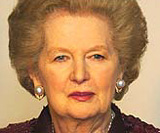 The Tory Party has marked 25 years since Margaret Thatcher became Britain's first female prime minister. The Tory Party has marked 25 years since Margaret Thatcher became Britain's first female prime minister.
Baroness Thatcher was the principal guest at a dinner at London's Savoy Hotel, attended by current Tory leader Michael Howard among others.
Mr Howard has described Lady Thatcher "as the greatest British prime minister since Winston Churchill".
Iain Duncan Smith and William Hague were among other former Tory leaders present at the dinner.
But Sir Edward Heath and John Major, Lady Thatcher's predecessor and successor as premier, were not among the guests.
A new portrait has also been unveiled for the anniversary by artist Richard Stone, better known for his pictures of the royal family.
The portrait is the fifth Lady Thatcher has sat for with the artist.
Lady Thatcher, a grocer's daughter from Grantham, Lincolnshire, first rose to prominence in the
Conservative partyduring the 1970s.
She became prime minister on 4 May 1979 and went on to earn the nickname 'the Iron Lady', becoming renowned for her strong response to the Falklands crisis, her programme of
privatisationand her disputes with British miners.
Such policies as the sale of council houses and the acceptance of the free market, bitterly contested as she drove them through, have become common currency among British parties.
While Lady Thatcher's supporters credit her with salvaging the British economy, her detractors argue that her policies destroyed British manufacturing.
As unemployment rose above three million in the early 1980s, she became one of the most controversial prime ministers in history.
Nevertheless she celebrated her third election victory in 1987, in which she returned to power with a 101 majority.
Her final administration saw the introduction of the
community charge, a tax on people rather than property, which became known as the
poll tax.
The policy saw some of the worst street violence in living memory, with a demonstration against the poll tax in London's Trafalgar Square in the spring of 1990 turning into a riot.
Many of the Cabinet also fell out with the prime minister over her determinedly anti-Europe stance.
Differences over the issue finally led to Geoffrey Howe quitting the government in November 1990 - and making a valedictory resignation speech from the
backbencheswhich fatally holed her premiership.
A fortnight later Lady Thatcher resigned, convinced that after 11 years in power she had lost the support of her own party.
But her legacy has been an undeniable influence on the Tory Party and British politics for the past 25 years.
|
